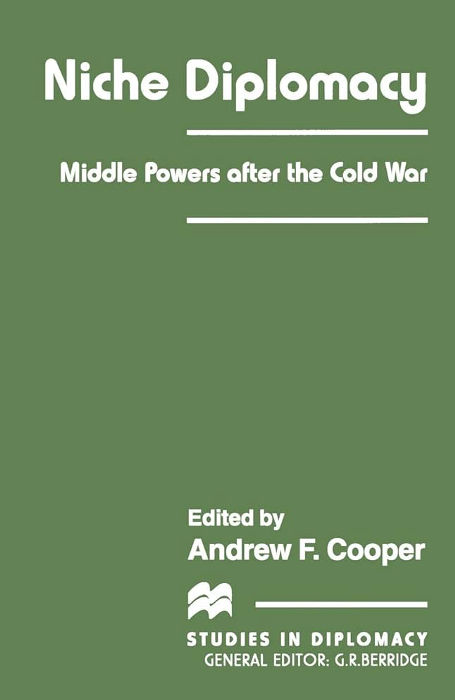Books
Andrew F. Cooper
Niche Diplomacy
Middle Powers After the Cold War
Niche Diplomacy: Middle Powers After the Cold War, edited by Andrew F. Cooper, explores how countries that are neither global superpowers nor small states have carved out specialized roles in international affairs. By focusing their diplomatic resources on targeted issues or regions, these “middle powers” have found ways to exert influence and contribute to global governance, despite their limited military or economic might. This collection is essential reading for understanding how states like Canada, Norway, Australia, Mexico, and Argentina have shaped international outcomes through strategic, focused engagement.
The concept of “niche diplomacy” describes how middle powers—states with moderate influence and strategic importance—pursue foreign policy objectives by specializing in particular functional or geographical areas rather than attempting to compete with great powers across the board.Case studies in the book illustrate this approach: Canada’s leadership in peacekeeping, Norway’s mediation in the Middle East peace process, Australia’s regional strategy in the Asia-Pacific, and the diplomatic initiatives of Mexico and Argentina in Latin America. These examples show how middle powers use their resources, expertise, and international credibility to build coalitions, mediate conflicts, and promote multilateral solutions.
Middle powers are often characterized by their commitment to multilateralism, coalition-building, and the pursuit of compromise in international disputes. Rather than challenging the global status quo, they seek to reinforce international norms and institutions, acting as “good international citizens” and moral actors on issues like human rights, environmental protection, and arms control. This volume highlights how, after the Cold War, economic and developmental concerns have become increasingly central to the foreign policies of emerging middle powers, reflecting a shift from traditional security issues to broader global challenges.
Niche Diplomacy demonstrates that middle powers, though lacking the reach of superpowers, play a vital role in maintaining international order and addressing transnational issues. By specializing in areas where they can make the greatest impact, these states enhance their international standing and contribute to a more stable, cooperative world system. This book is indispensable for students and scholars of international relations seeking to understand the evolving strategies and significance of middle powers in the post-Cold War era.

